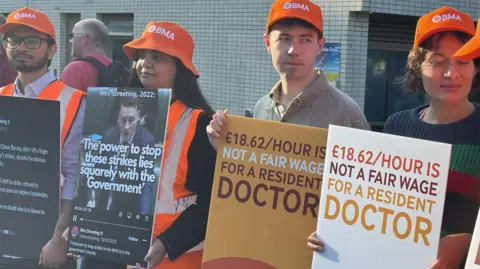**Streeting Commits to Minimize Disruption Amidst Doctor Strike**
In the wake of a significant five-day strike by resident doctors in England, Health Secretary Wes Streeting is determined to ensure that NHS services continue to function effectively. The strike, which has commenced amidst a backdrop of contention over pay, compensation, and working conditions, poses a considerable challenge to the functioning of the healthcare system.
Streeting addressed the situation, assuring the public that the government would make every effort to mitigate the disruption caused by the strike. He noted that NHS England has directed hospitals to cancel routine treatments only in exceptional circumstances. This directive reflects a concerted effort by the NHS to maintain non-urgent services operational, a shift from earlier strikes when emergency care predominated the focus.
The ongoing strike represents the 12th instance of resident doctors walking out in response to a protracted pay dispute. The British Medical Association (BMA) has expressed concerns that relying on senior doctors to cover for striking resident doctors could overstretch available medical staff. They contend that the government has had ample opportunities to prevent this industrial action from occurring by addressing pay grievances.
As the strike commenced, Prime Minister Sir Keir Starmer implored resident doctors to reconsider their decision to strike, characterizing such actions as damaging to the NHS. He indicated that the walkout would impart substantial harm to both the NHS and the wider country and critiqued the BMA for hastily resorting to strikes. Starmer underscored that these disruptions threatened the progress made in revitalizing the NHS over the past year.
Streeting acknowledged the unfortunate reality that ongoing strikes would impede the advancements being made to recover the NHS but reiterated his commitment to minimizing the impact on patient care. While he expressed a clear commitment to maintaining essential services, the complexities outlined by resident doctors’ strikes continue to pose potential risks to patient safety and wellbeing.
In preparation for the strike, NHS England encouraged the public to seek medical care as needed, emphasizing that GP surgeries would remain operational. Urgent Care and Accident & Emergency (A&E) services will also be available alongside NHS 111 for immediate health needs, signaling the NHS’s intent to uphold healthcare accessibility during the strike period.
The current strike emerged following a breakdown in negotiations between the government and the BMA, who had attempted to resolve ongoing issues related to costs of examinations, career advancement, and terms of employment. Although the government has stated that pay negotiations are off the table, the BMA underlines that existing salaries have not kept pace with inflation. Despite an average pay increase of 5.4% this year after a substantial rise over the previous two years, resident doctors’ real earnings have dropped significantly since 2008.
Resident doctors currently earn an annual salary of £38,831 during their foundation year, which increases to £44,439 in the second year, with salaries surpassing £73,000 upon completion of their training. This pay structure does not reflect the demanding hours oftentimes entailed by the role, as many doctors supplement their income through additional shifts and night work.
Members of the BMA, Dr. Melissa Ryan and Dr. Ross Nieuwoudt, conveyed their commitment to advocating for fair compensation, asserting that resident doctors deserve better recognition for their work given the sacrifices they make. They criticized the government for neglecting to act decisively to prevent the strike, arguing that restoring fair pay is crucial to improving working conditions.
Historical data from previous strikes indicates significant disruptions, with over one million appointments and treatments canceled, underscoring the pressing effects of such strikes on patient care. However, NHS sources now express optimism about this strike, emphasizing that past experiences have informed a new strategy designed to preserve non-urgent care and alleviate some of the burdens faced by patients.
Prof. Meghana Pandit of NHS England underscored the critical importance of reducing cancellations, citing the adverse effects on patients waiting for essential procedures like hip replacements and other operations. Despite the efforts to keep services running, it remains clear that disruptions will accrue, and patients are urged to continue seeking the care they require during this challenging period.
As the strike proceeds, concerns continue to mount regarding the safety and effectiveness of the healthcare workforce, as those remaining on duty may face immense pressure. The dynamics of this strike exemplify the broader issues facing the NHS, as representatives from both the government and various health organizations navigate the delicate balance between addressing staff concerns and maintaining an accessible and effective healthcare system for all.











